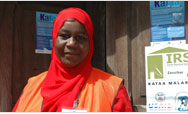Madagascar
Madagascar’s President is committed to family planning, demonstrated by support for the Ministry of Health/Family Planning (MOHFP) to procure $500,000 in family planning commodities. In addition, the President, with the support of USAID, brought together faith-based groups, youth leaders, provincial governors, regional officers, provincial and district health officers, the Minister of Health and Family Planning, and six other ministers to underscore the cross-sectoral importance of population demographics. USAID/Washington commended the government and USAID/Madagascar for making great strides in developing a multisectoral vision for family planning and how it contributes to the health and development goals of the country. Among their achievements, Madagascar was among the first countries in sub-Saharan Africa to hold such a national conference as a way to position family planning as a multisectoral national health and development priority.
USAID increased access to family planning services and products through USAID’s social marketing program and community-based distribution which contributed to significant improvements in family planning. For example, in fiscal year (FY) 2005 1,383,363 cycles of oral contraceptives were sold giving 111,547 in couple-years of protection (CYP); and, 544,401 doses of injectable contraceptives were sold giving 160,414 in CYP. These represent increases of more than 11 percent and 21 percent respectively from FY04 sales.
USAID continues to utilize a variety of partners for educating the broader population on family planning and reproductive health (FP/RH) issues and for providing family planning services. In FY05, USAID expanded its FP/RH partners to include a variety of faith-based organizations and mass media outlets. USAID worked with an emerging church-based development nongovernmental organization (NGO) to create an inter-denominational network of eight churches and church organizations, including Christians and Muslims, that will educate church members on issues related to family planning and to provide services to underserved populations. USAID also worked with the MOHFP to engage mass media to advocate for family planning. Through USAID efforts, all the main national and regional radio and television stations are broadcasting daily spots on the health and economic benefits of family planning and birth spacing.
Integrating development activities into conservation efforts improves child health, increases contraceptive prevalence rates (CPR), and reduces food insecurity as means of reducing overall pressures on natural resources. USAID supports the family planning activities of two conservation organizations, Conservation International (CI) and World Wildlife Fund for Nature, that continued to link health, nutrition, and family planning activities with conservation efforts in communities near biodiverse priority areas in Toamasina Province and the south of Madagascar. These integrated activities are showing good results with an increase in the CPR in target areas from 6 percent in 2004 to 12 percent in 2005. Childhood vaccination coverage increased from 30 percent to 44 percent in participating areas. And, improved agriculture practices through CI work with farmers to reduce slash-and-burn agriculture and improve alternative rice production techniques. In addition, through its repositioning efforts, USAID/Washington provided an additional $350,000 for an innovative “extra mile” initiative to extend access in remote biodiverse areas. The “extra mile” was launched in September 2005 to reach the most food-insecure, hard-to-reach poor rural families with family planning services and products in 14 remote communes.
|


